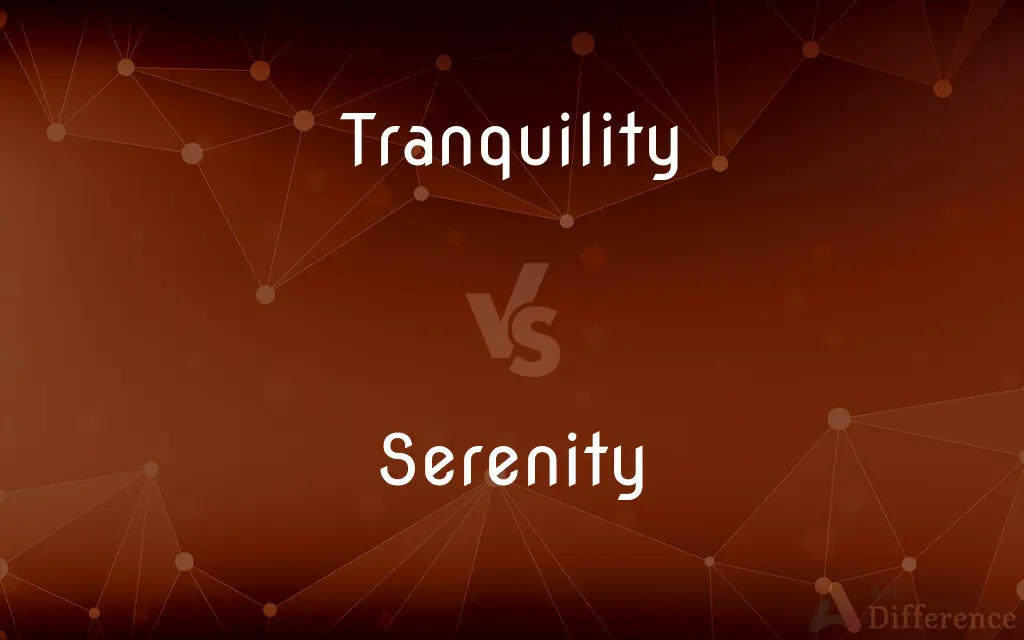Tranquility vs. Serenity — What's the Difference?
By Tayyaba Rehman & Maham Liaqat — Updated on April 6, 2024
Tranquility refers to a state of peace and calm, often free from disturbance or turmoil, while serenity describes a more profound inner peace, sometimes tied to a clear and untroubled mind.

Difference Between Tranquility and Serenity
Table of Contents
ADVERTISEMENT
Key Differences
Tranquility is often associated with external environments that are calm and undisturbed, providing a sense of peace and quiet. This could be a tranquil garden or a quiet, secluded area where one can relax without the interference of noise or chaos. On the other hand, serenity is more closely related to an internal state of being. It suggests a depth of peace that pervades one's inner self, regardless of external circumstances.
While tranquility might be achieved by seeking out specific physical environments or situations that are inherently peaceful, serenity is cultivated internally, often through practices like meditation, deep reflection, or spiritual disciplines. These practices help individuals find peace within themselves, even in the midst of external turmoil or stress.
Tranquility can be seen as a prerequisite for serenity in some contexts. A tranquil environment can facilitate the internal journey towards serenity, providing a setting conducive to relaxation and introspection. Whereas serenity, once attained, can be maintained even when tranquility in the external environment is disrupted.
The pursuit of tranquility often involves removing oneself from the hustle and bustle of everyday life, seeking out silence or solitude. This contrasts with serenity, which can be a continuous state of peace that a person carries with them throughout their daily activities, not dependent on their surroundings.
Tranquility and serenity both contribute to mental health and well-being, but they do so in different ways. Tranquility offers a temporary respite from stress, serving as a restorative break. Serenity, however, is more about cultivating a lasting peace that affects how one perceives and reacts to the world around them.
ADVERTISEMENT
Comparison Chart
Nature
More external, related to calm environments.
More internal, related to a state of mind.
Achievement
Often sought in physical spaces of calm.
Cultivated through internal practices.
Stability
Can be temporary, influenced by external changes.
More enduring, persists despite external circumstances.
Relation to daily life
Seen as an escape or break from routine.
Integrated into daily life as a personal state.
Contribution to well-being
Provides immediate, temporary relief.
Offers a deeper, more sustainable peace.
Compare with Definitions
Tranquility
A state of peace and calm in one's surroundings.
The garden's tranquility made it a perfect spot for meditation.
Serenity
A quality of being clear and free from stress or anxiety.
The mountain top offered a sense of serenity unlike any other.
Tranquility
The quality of being free from noise or unnecessary activity.
The library's tranquility makes it my favorite place to study.
Serenity
The state of being calm, peaceful, and untroubled.
She achieved serenity through daily meditation.
Tranquility
Freedom from disturbance or turmoil.
She found tranquility by turning off her devices and enjoying the silence.
Serenity
A state of mind that transcends temporary peace, indicating a deep, enduring tranquility.
Achieving serenity has become her ultimate goal in life.
Tranquility
The state of being undisturbed by emotions or thoughts.
He maintained his tranquility even in stressful situations.
Serenity
An inner peace that reflects in one's demeanor.
His serenity in facing challenges is admirable.
Tranquility
A tranquil condition of the mind, often influenced by serene environments.
His tranquility after the retreat was noticeable.
Serenity
The ability to maintain peace within oneself despite external chaos.
Her serenity amidst the crisis was a beacon for all.
Tranquility
The quality or state of being tranquil; serenity.
Serenity
The state or quality of being serene.
Tranquility
Standard spelling of tranquillity
Serenity
The state of being serene; calmness; peacefulness.
Tranquility
A disposition free from stress or emotion
Serenity
A lack of agitation or disturbance.
Tranquility
A state of peace and quiet
Serenity
A title given to a reigning prince or similar dignitary.
Serenity
The quality or state of being serene; clearness and calmness; quietness; stillness; peace.
A general peace and serenity newly succeeded a general trouble.
Serenity
Calmness of mind; eveness of temper; undisturbed state; coolness; composure.
I can not see how any men should ever transgress those moral rules with confidence and serenity.
Serenity
A disposition free from stress or emotion
Serenity
The absence of mental stress or anxiety
Common Curiosities
Is serenity a constant state?
Serenity can be a more continuous, enduring state of peace that one maintains regardless of external circumstances.
How does serenity differ from tranquility?
Serenity is more about an inner state of peace and calm, not dependent on the external environment.
What is tranquility?
Tranquility refers to a peaceful and calm state, often related to one's environment being free from disturbance.
Can someone feel serene in a noisy environment?
Yes, serenity, being an internal state, can be maintained even in noisy or chaotic surroundings.
Can tranquility exist without serenity?
Yes, one can experience a tranquil environment without necessarily feeling serene internally.
How do tranquility and serenity impact mental health?
Both contribute to mental health: tranquility by offering a respite from stress, and serenity by fostering a deep, enduring peace.
How can one achieve tranquility?
Tranquility is often achieved by seeking quiet, peaceful environments or situations that are free from turmoil.
How can one achieve serenity?
Serenity is cultivated through internal practices like meditation, deep reflection, and spiritual disciplines.
Can tranquility be disrupted easily?
Since tranquility is often tied to external conditions, it can be more susceptible to disruption.
Can tranquility lead to serenity?
Yes, a tranquil environment can facilitate the internal journey towards achieving serenity.
Does serenity affect how one deals with stress?
Yes, serenity involves a deep peace that can change how a person perceives and responds to stress.
Do tranquility and serenity contribute differently to well-being?
Yes, tranquility offers temporary relief from stress, while serenity provides a deeper, more lasting peace.
Is it easier to achieve tranquility or serenity?
Achieving tranquility might be easier as it often involves physical spaces, whereas serenity requires internal work.
Is serenity a goal worth pursuing?
Yes, achieving serenity can lead to a profound sense of peace and fulfillment, making it a valuable pursuit.
Can serenity exist without tranquility?
Yes, serenity is possible even in the absence of a tranquil environment, as it is an internal state.
Share Your Discovery

Previous Comparison
Dragon vs. Griffin
Next Comparison
Polity vs. DemocracyAuthor Spotlight
Written by
Tayyaba RehmanTayyaba Rehman is a distinguished writer, currently serving as a primary contributor to askdifference.com. As a researcher in semantics and etymology, Tayyaba's passion for the complexity of languages and their distinctions has found a perfect home on the platform. Tayyaba delves into the intricacies of language, distinguishing between commonly confused words and phrases, thereby providing clarity for readers worldwide.
Co-written by
Maham Liaqat













































